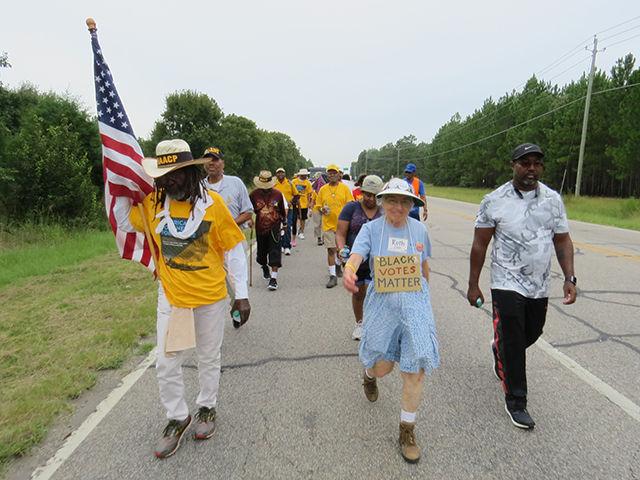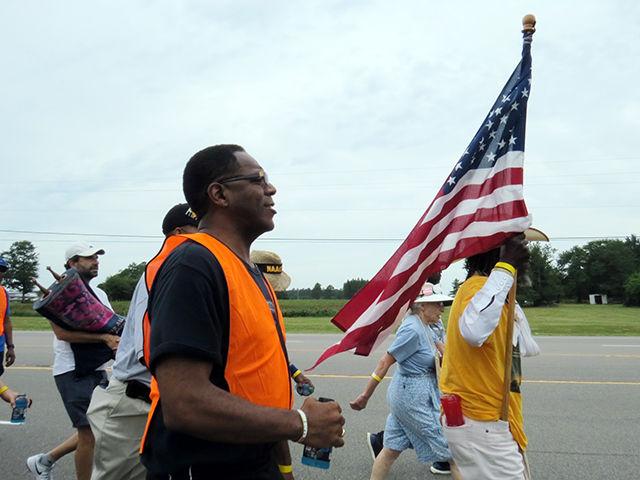Justice does not come easy, and it often doesn’t last, as the marchers have found in America’s Journey for Justice, an NAACP-led march from Selma, Alabama to Washington, D.C. For this reason, they have not turned back yet, and this weekend they made it into North Carolina, marking the halfway point of their 860-mile journey.
The marchers, though many have rotated in and out of the ranks, have included children as young as 10 and elders as old as 85 braving the summer heat for an average of 26 miles a day since the march began on Aug. 1.
“We’ve been here before; we won these same battles 10 years ago when we started HKonJ,” said Reverend Curtis Gatewood, the North Carolina NAACP’s coordinator for the event.
The Historic Thousands on Jones Street People’s Assembly Coalition, or HKonJ, began in 2006 and is made up of more than 250 social justice groups in North Carolina, including all 125 branches of the NAACP in the state. HKonJ has seen many of its successes rolled back in recent years:
• House Bill 589, passed in 2013, included provisions that moved polling sites off of college campuses, shortened the early voting period by seven days, eliminated same-day registration and required voters to present photo ID at the polls. The bill originally included only 16 pages of language related to voter ID regulations, which were similar to that of other states, but when the Supreme Court struck down Section 5 of the Civil Rights Act of 1965, thus allowing states to change their voting laws without federal approval, the bill was extended to 57 pages and packed with extra restrictions.
• The Racial Justice Act of 2009, which sought to eliminate the possibility that the death penalty could be used on the basis of race. The act identified types of evidence that might be considered by the court when considering whether race was a basis for seeking or imposing the death penalty, and established a process by which relevant evidence might be used to establish that race was a significant factor in seeking or imposing the death penalty. The act was repealed in 2013 by Gov. Pat McCrory.
• Increases in the federal minimum wage are also being battled in the state government.
“The more you win, the more you have to maintain,” Gatewood said.
On Saturday, the marchers took a break for the night on the border of South and North Carolina for a teach-in on criminal justice led by Redditt Hudson, a former cop who now works for the NAACP and chairs the board of the Ethics Project.
Hudson told the story of his training day as a police officer in St. Louis, Missouri, during which he witnessed the white female cop who was training him break into the home of and beat a teenaged black man accused of an armed robbery and escaping on foot, even though the man was on crutches.
“Accountability is everything,” Hudson said in reference to the abuses of power that he saw police officers of all races commit, though he acknowledged that the ones abused were often, if not always, black.
“It’s not just the cases you see on television, it’s the everyday abuse of our dignity and of our bodies at the hands of police officers that creates these tensions,” Hudson said.
For Hudson, white supremacy is a reality that all of us were born into, and he said that acknowledging this fact does not indict all white people.
“Our responsibility, why we march, is to change that reality,” Hudson said.
The focus of the march through North Carolina will be voting rights, with one court case on whether H.B. 589 was passed with an intent to discriminate awaiting a final ruling and a case set to begin on Monday to determine the legality of redistricting practices in North Carolina.
“North Carolina is the battleground,” said Michelle Laws, executive director of the NC NAACP. “It’s in the courts, now we’re taking it to the highways.”
Patrick O’Neill, a lifetime advocate for civil rights, said that in all of his years marching for various causes, “I never thought we’d be marching for voting rights.”
The NAACP’s stated demands are as follows: national standards for use of force for all law enforcement agents and the passage of the End Racial Profiling Act; federal action to ensure every student has access to safe, high quality education regardless of location or household income; federal prioritization of job creation and training, and passage of the Raise the Wage Act and the Paycheck Fairness Act; and that Congress restore, strengthen and advance the 1965 Voting Rights Act by passing the Voting Rights Advancement Act.
However, Rvd. Gatewood said, “There is no one bill that will rectify what we are facing as a community.”
The march is scheduled to hold a rally in Raleigh on Thursday at 5 p.m. “to demand that Congress restore the Voting Rights Act and North Carolina Legislators protect rather than suppress the vote of the people they vowed to represent.” The march will conclude in Washington D.C. on Sept. 16 with a day of rallying and lobbying Congress on the issues raised throughout the march.
Reverend Curtis Gatewood marches on the Journey for Justice on Sunday. "The more you win, the more you have to maintain," Gatewood said.









